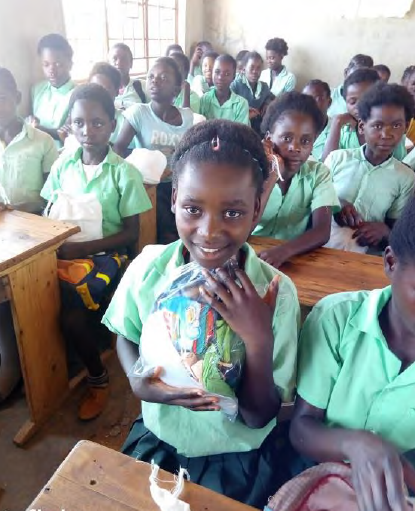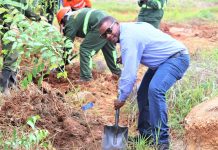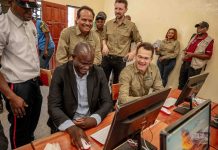Far too many girls in Zambia stay at home each month because they’re menstruating. Fear of getting an unpleasant surprise at school because they’re unsure when to expect their period is just one of the reasons that girls skip school when that time of the month arrives. The number of lessons missed over five or six or even seven school years can have a devastating effect on girls’ education.
One year ago, a small, dedicated team from Kansanshi Mine devised a Menstrual Health Management program with the potential to have a huge impact on Zambian girls’ education.
Read on to find out more about Jimuka, the simple yet effective program which is being welcomed with open arms by girls in Solwezi’s surrounds.
What is “Jimuka”?

Jimuka is a word in Zambia’s local Kaonde dialect that essentially means “be sharper” or “less ignorant”, explains Pamela Chanda, Kansanshi Mine’s Gender Officer, who heads up the Jimuka initiative. The program’s aim is to provide girls with vital information about menstrual health so they have the confidence to get on with their lives each month.
Since January 2018, Pamela and her team have been making regular visits to primary and secondary schools near Kansanshi Mine where teachers feel students would benefit from additional guidance on menstrual health and hygiene. All students who have “come of age” are invited to attend an afternoon session in which questions are raised, and important aspects of menstruation are discussed in groups.
The discussion is facilitated by one of Jimuka’s five team members, who take it in turns to bring their perspective to the discussion. “This is so we have variety in our presentations,” says Pamela. “Some of the facilitators are younger, some are older, so students respond differently.”
What does the program involve?

The facilitator spends some time recapping students’ basic knowledge about puberty, menstruation, and their accompanying signs. Like children all around the world, Zambian girls often have concerns about reaching puberty, and what to do when they start menstruating.
Most girls don’t fully understand the menstrual cycle, which means they never know quite when to expect their period. This leads to countless “accidents” at school, and the accompanying embarrassment keeps students at home when they suspect their time of the month is approaching. Pamela’s team teaches students exactly how to count the days in their cycle so they know when to come to school prepared.
“We use the local language during the talks – not English,” says Pamela. “It brings it closer to home. We don’t want to make anything seem difficult to understand or intimidating.”
Teasing other girls if they have an accident is discouraged, says Pamela. “And we explain that their period is not an excuse to miss lessons.”
Stay in School Kits

Complimentary Stay in School Kits are central to the Jimuka initiative. Access to sanitary products is a challenge for many girls in rural communities, and home-made solutions tend to be unreliable. Girls attending a Jimuka session are given a menstrual hygiene kit containing two well-made, washable sanitary pads with fastenings to keep them in place. Extra underwear, washing powder, washcloths, and soap are also included in the kits. It’s all the essentials for maintaining good menstrual hygiene.
The pads are made of familiar, brightly coloured chitenge fabric, which many girls use to improvise low-cost sanitary solutions. Kansanshi engages a local tailor make the pads but, as demand increases, there are plans to hold sewing classes in which the girls can follow a pattern to make their own.
“When are you coming back?”

The kits are generally very popular, and students who chose not to attend a session often wish they had when they see them. “The girls always ask ‘When are you coming back?’” says Pamela. The Jimuka team made two trips to Rodwell Mwepu Primary School in October 2018, equipping 1,785 girls with the Stay in School Kits.
It’s not just the free products that are well-received. Openly discussing facts and myths around menstruation is empowering for young women, some of whom have had a very traditional upbringing.
One 12-year-old student from Kimakolwe School said the Jimuka team’s visit would help her to avoid accidents at school. “I learned more about periods today, and how to count my numbers. I feel more confident.”
Challenges still abound
Lack of knowledge about menstruation is one of the major reasons that girls stay at home when they’re menstruating. But certain customary traditions also instil in girls the belief that they are impure during menstruation.
“They are told not to be around boys as that time of the month because they are ‘unclean’,” explains Pamela. “They are not supposed to talk to the opposite sex, including brothers and male family members, about menstruation. They are not allowed to cook while on their menses.”
Openly discussing facts and myths around menstruation is empowering for young women, some of whom have had a very traditional upbringing.
Old wives’ tales such as the belief that you become infertile if you hang underwear to dry outside also cloud this natural, biological process in myth.
“We don’t overrule the myths,” says Pamela. “All of us grow up with different beliefs. We just tell the girls what a period is. We give them advice on them how to look after themselves – they can take it or leave it.”
Menstrual education is a win for everyone

Schools have reported major reductions in absenteeism since the Jimuka team’s visits. Parents have expressed relief that embarrassing accidents at school are a thing of the past for their daughters. Teachers are also relieved that they are no longer obliged to buy sanitary products for unprepared girls, and hygiene has improved at most schools.
The girls tell Pamela and her team that they feel more confident around other people, even when they are on their menses. They find the kits comfortable and easy to use, with zero allergies reported so far. Both the kits and the girls’ newly-acquired knowledge have given them freedom to participate more in extracurricular activities like sports.
As far as Kansanshi’s team is concerned, reduced absenteeism is a major win for the area’s development. Encouraging girls to complete their school career leads directly to a more promising future. Traditional beliefs about educating girl children being pointless are slowly but steadily getting left in the past, says Pamela. “People are becoming aware that education is the future of the country, and that literacy is important in any job.”
Meanwhile, the girls feel empowered to get on with their lives, even when it’s that time of the month. “You can do whatever you want and be whoever you want to be – even on your menses,” Pamela tells them.
“It’s great to work with young people,” she says. “It’s very touching when the girls receive a bar of soap or something that they can’t normally afford. I really love my job.”
See also:Grace, grit and determination






















